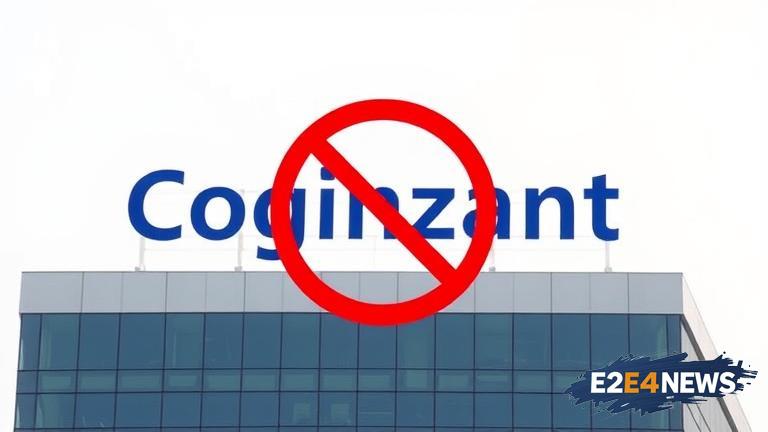In a significant ruling, the Bombay High Court has reinstated a ban on Cognizant, a leading IT services company, from using its logo in India. The court’s decision comes after a lengthy legal battle between Cognizant and a Mumbai-based company, which claimed that the logo infringed on its trademark. The Mumbai-based company, which is not named in the report, had filed a lawsuit against Cognizant alleging that the company’s logo was similar to its own. The court initially granted an interim order in favor of the Mumbai-based company, but Cognizant appealed the decision. However, the Bombay High Court has now restored the ban, citing trademark infringement. The court’s ruling is a significant setback for Cognizant, which has a large presence in India. The company has been using its logo in India for several years and has a significant brand reputation in the country. The ban on the logo is likely to affect Cognizant’s business operations in India, as it will not be able to use its logo on its marketing materials, website, and other promotional materials. The company may have to rebrand its operations in India, which could be a costly and time-consuming process. The ruling is also a significant victory for the Mumbai-based company, which had been fighting to protect its trademark. The company had alleged that Cognizant’s logo was similar to its own and could cause confusion among customers. The court’s decision is a reminder of the importance of protecting intellectual property rights in India. The country has a growing economy and a large consumer market, making it an attractive destination for foreign companies. However, companies operating in India must be aware of the country’s intellectual property laws and take steps to protect their trademarks and other intellectual property. The Bombay High Court’s ruling is a significant development in the area of intellectual property law in India and is likely to have implications for companies operating in the country. The ruling highlights the need for companies to conduct thorough research and due diligence before launching their products or services in India. It also underscores the importance of protecting intellectual property rights in India, where the economy is growing rapidly and the consumer market is expanding. The court’s decision is a significant setback for Cognizant, which has been expanding its operations in India in recent years. The company has a large presence in the country and has been investing heavily in its Indian operations. However, the ban on its logo is likely to affect its business operations and could impact its revenue and profitability. The company may have to rebrand its operations in India, which could be a costly and time-consuming process. The ruling is also a significant victory for the Mumbai-based company, which had been fighting to protect its trademark. The company had alleged that Cognizant’s logo was similar to its own and could cause confusion among customers. The court’s decision is a reminder of the importance of protecting intellectual property rights in India and the need for companies to take steps to protect their trademarks and other intellectual property. The Bombay High Court’s ruling is a significant development in the area of intellectual property law in India and is likely to have implications for companies operating in the country. The ruling highlights the need for companies to conduct thorough research and due diligence before launching their products or services in India. It also underscores the importance of protecting intellectual property rights in India, where the economy is growing rapidly and the consumer market is expanding. The court’s decision is a significant setback for Cognizant, which has been expanding its operations in India in recent years. The company has a large presence in the country and has been investing heavily in its Indian operations. However, the ban on its logo is likely to affect its business operations and could impact its revenue and profitability. The company may have to rebrand its operations in India, which could be a costly and time-consuming process. The ruling is also a significant victory for the Mumbai-based company, which had been fighting to protect its trademark. The company had alleged that Cognizant’s logo was similar to its own and could cause confusion among customers. The court’s decision is a reminder of the importance of protecting intellectual property rights in India and the need for companies to take steps to protect their trademarks and other intellectual property. The Bombay High Court’s ruling is a significant development in the area of intellectual property law in India and is likely to have implications for companies operating in the country. The ruling highlights the need for companies to conduct thorough research and due diligence before launching their products or services in India. It also underscores the importance of protecting intellectual property rights in India, where the economy is growing rapidly and the consumer market is expanding.
